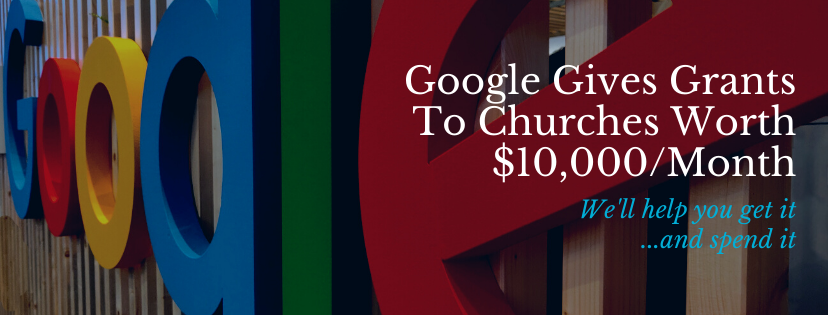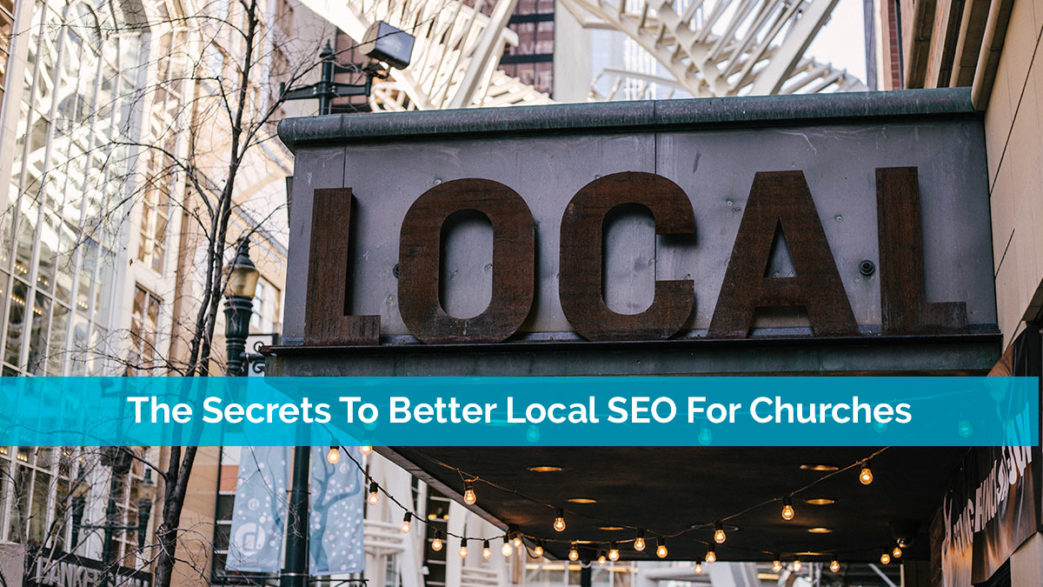Churches have to think about two types of SEO – the standard SEO for optimizing for general search and local SEO for local searches. Mastering local SEO for churches is key to attracting more people to your church.
The great thing is there are plenty of free ways to improve your local SEO. However, it does take a little work to set everything up.
When you see more people visiting your church and becoming new members, all that work is well worth it. Plus, once the initial setup is over, you’ll just have a simple routine each week, making managing your local SEO even easier.

Benefits Of Local SEO For Churches
You’ve already added some general keywords to your website. Why do you need to focus on local SEO on top of standard SEO? As a local business, you’re not just trying to attract people to your website. You’re also trying to get them to visit in person too.
This means you need to focus your efforts to help people find you when they use more localized keywords, such as a city or the nickname of a community. Odds are, there is more than one church in your area. By optimizing your local efforts, you’ll appear higher in search results than the competition.
More people than ever are turning to Google to find local businesses, including churches. In fact, 46% of Google searches are for local businesses. A few more interesting stats that prove that local SEO is worth it include:
- 72% of people searching locally visit shortly after seeing the results
- Nearly a third of mobile Google searches are for local businesses
- 86% of searches use Google Maps to find businesses
- Searches including “near me” have grown by 150%
Local searches are rising and if you want your church to be found easier, you need to focus on the local part of your SEO strategy.
Understanding The Google Snack Pack
At the time of writing, Google’s search engine had a 92.06% market share, so most of your search traffic comes from Google. That’s why it’s important to understand the Google Snack Pack.
When people add a local qualifier or they’re logged in to their Google account, they’ll see Snack Pack results above the organic results. These top three results are local businesses along with their rating, location on a map and a few more quick details.
Getting your church in this coveted spot means you’ll need to claim your Google My Business listing, which is free and surprisingly easy. Obviously, you want to be listed in the Snack Pack results as they’re listed above everything else.
Claim Your Google My Business Listing
Your Google My Business listing is a verified business listing with details about your church. This is one of the easiest things to do to improve local SEO for churches. However, it’s important to always keep your listing up to date. Also, avoid any conflicting information from anywhere else online, such as your website or social media accounts, as this can hurt your rank.
All you have to do is visit Google My Business. Create an account for your church, search for your church (a general listing my already exist), claim your listing or create one if nothing exists, follow the steps to verify the details and fill out all the relevant information.
Make sure you fill out everything that’s relevant to your church. The more details you have, the better you’ll rank for local searches. Also, add images to really stand out.
Verifying your listing ensures you show up on Google Maps too, which is another site/app where people may search for your church.

Claim Bing Places And Apple Maps Listings Too
While Google My Business is definitely the most popular option, there are two other business directories to consider. Bing Places and Apple Maps are both popular. Many iPhone users opt to use Apple Maps over Google.
If you want the best local SEO for churches, ensure you’re reaching as wide of an audience as possible. This means ensuring your church’s data is correct on multiple popular business directories. Another site to consider is Yelp.
Add Local Citations
Since people are searching for local businesses, you’ll want to focus on local citations. There are several popular versions you might see, such as NAP, UNAP and NAPU. These refer to name, address, phone number and URL.
In most cases, local citations appear in a structured format on business directories (such as those above), social media profiles, event announcements, website footer and sometimes even local write-ups about your church. There are also unstructured citations where the details may be listed all on a single line, such as a press release, write-ups about your church and even on your church’s blog and events page.
Both types are ideal. However, take the time to ensure all the listings say the same thing. For example, if your church has changed location, update the address everywhere you can. You can contact webmasters to let them know about the change.
Google is less likely to display your church first in local searches if there are discrepancies between your data. However, local citations are one of the most important Google factors, so add citations on your website, business listings and social media profiles.
You can run a quick check on nine major local business listing sites using Moz’s Check Your Online Presence Tool. It’s free to use and shows whether anything is different.
Make Sure You’re Mobile-Friendly
Since 2015, mobile Internet traffic has grown from 31.16% to 52.6% as of the end of 2019. This means over half of all Internet traffic is coming from mobile devices.
If you remember from earlier in the post, almost a third of all local Google searches come from mobile devices. If your website isn’t mobile-friendly, it can hurt your search rank. Even if you’ve optimized your website for local search, Google still won’t show it in organic local search results if it’s optimized for mobile devices.
Master On-Page SEO
Your on-page SEO, which refers to your church website, is just as important as claiming business listings. Not only does it help with local SEO for churches, but it’ll also boost your overall search rank.
There are several main areas to try to optimize with relevant keywords, including:
- Header tags (website header and sub-headers throughout your site)
- Title tag
- URLs (including blog post URLs)
- Meta descriptions
You don’t have to use the same exact keyword everywhere. We’ll cover a little more on local keywords below. However, you want to go beyond generic terms like “church” or “church blog post 34.”
For your website’s main header tag, you might use “First Baptist Church in Charleston, West Virginia.” Suddenly, you’re not just another “First Baptist Church.” You’re a church with a location.
Of course, you won’t have to use local keywords everywhere. For example, a blog post on “how to pray without distractions” wouldn’t likely use a localized keyword. But, a post on “volunteering more in West Virginia” could be localized.

Optimize Local Images
Images are often overlooked. However, they’re one of the quickest and easiest ways to improve local SEO for churches. Take a quick look at some of the images on your website’s home page. What are they named?
If you’re like most churches and websites in general, you’re probably using names like “church-image-1” or whatever name your camera gave the image. Instead, use real names for your images, including local keywords when appropriate.
For example, if you have a header image of your church, name the image with your church’s name and location. You can even add a description of the image when uploading it that includes your church’s address.
Do this for any local images and you will improve your local search ranking. Also, use keyword-based names for all your images to help with search results, even if they’re not local.
Use Location-Based Keywords
We’ve already mentioned that you should use location-based keywords, but you don’t want to use the same keyword over and over. In fact, keyword stuffing is a major red-flag to Google.
Sadly, most keyword planning tools aren’t quite as useful when it comes to helping with local keywords. So, you’ll need to do much of the hard work yourself. The good news is most of the process is creating keywords you can combine in different ways.
Some tips for generating location-based keywords include:
- List different ways you’d search for your own church, such as “best churches in your city” and “baptist churches in your city“
- Use variations on your church’s location, such as listing the state and city, just the city, just the state and even nicknames for your area
- Details about your church, such as “church service hours”
- Enter keywords in Google and see what ideas autocomplete provides
A minimalist tool that may help is 5 Minute Site. While their website generator tool won’t help you score any real points with Google, their keyword tool helps you with targeting your specific area and surrounding areas along with any keywords you choose, such as the name of your church.
Optimize For Larger Areas Too
You don’t have to limit yourself to your specific city, especially if it’s a smaller city. If your church is on the outskirts of a major metro area, optimize for that keyword too.
For instance, if your church is located in a city 10 miles outside of Austin, Texas, you might add that detail to your business listing and website. Your keyword might be “baptist church near Austin, Texas.” This helps you to reach local searchers in Austin and surrounding cities. Once again, it’s about reaching all local searchers who want to attend.

Use Schema Markup
This isn’t nearly as technical or difficult as the name might imply. Schema is a type of vocabulary used to help search engines better understand the data on your website.
You can do this manually, but it’s much easier to use a tool like Google’s Structured Data Markup Helper. This tool takes you step-by-step through helping Google better understand your site.
If you’re not sure what schema markup is all about, Moz’s schema guide (and linked resources at the bottom of their guide) is an excellent resource. Search Engine Journal also makes it all easier to understand with less technical jargon.
Overall, it’s a great local SEO practice, though it doesn’t always have the same level of benefits for organic search.
Blog Regularly About Local Issues
This doesn’t mean you should turn your church blog into the local online newspaper. However, you should try to add in some local-based posts. For instance, you might post about how proud your church is of your local graduates, where you include the names of their schools and the cities.
You could also post about local events that your church is a part of or even your own events. Every blog post doesn’t have to be local. Adding in a mix of local posts will help. You might even consider linking to local sites when relevant.
Guest Blog For Links And Exposure
Guest blogging is another great way to boost local SEO for churches. While backlinks are highly useful in boosting your rank, exposure is just as important. Try to pick relevant blogs with a good reputation. These don’t always have to be local either.
However, insert local keywords or ask to add your church’s name and location at the end of the post. This gives you yet another local citation and provides readers with your church’s location.
Monitor Your Online Presence
Finally, keep track of your online presence. It doesn’t take nearly as much work as the initial setup, but you want to check in to ensure your online presence is consistent. Keep a list of every place you have a listing, social media profile and guest blog post.
Ensure your information remains the same on all of them. Also, keep up your blogging strategy to continue keeping your local and organic search ranks higher.
Remember, a church website is critical to boosting local SEO for churches. It’s an ideal resources for blogging, local citations, local keywords and more. See how our church website design services can help you.




